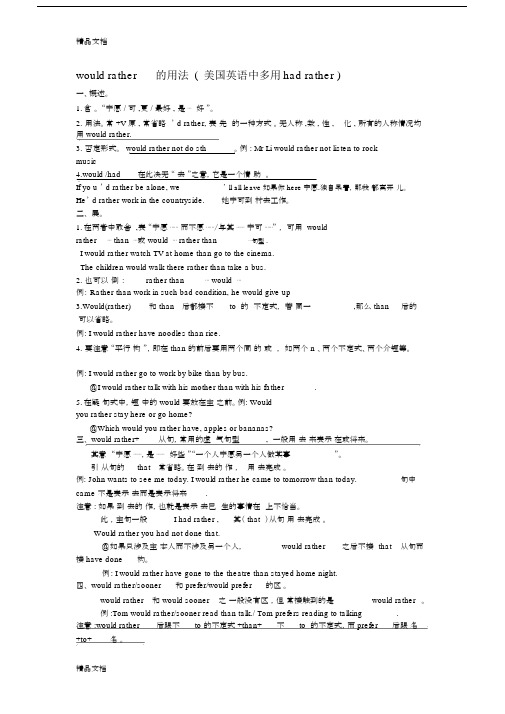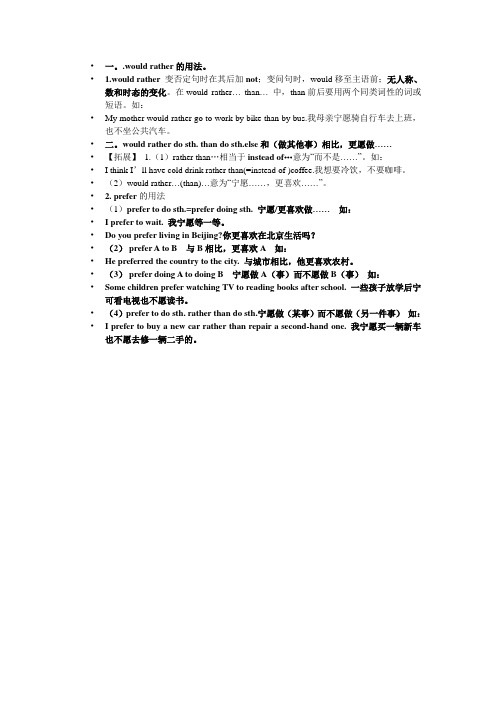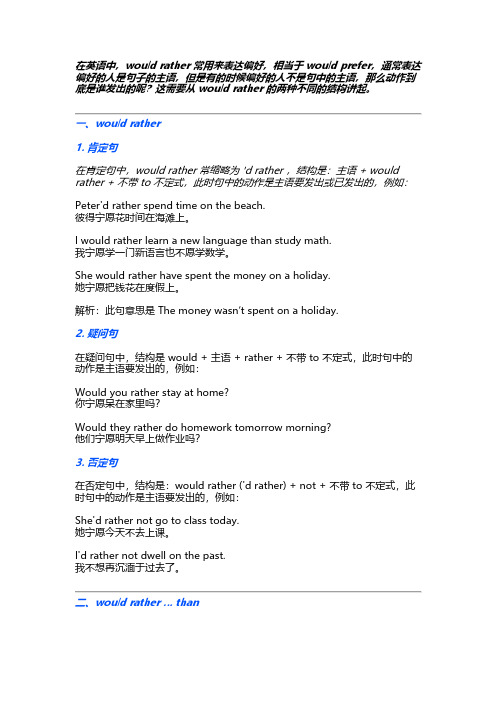最新整理高中英语would rather用法几个关键点解说.docx
- 格式:docx
- 大小:11.49 KB
- 文档页数:3

would rather的用法讲解下面是小编整理的一些关于would rather的用法,希望呢个更好地认识would rather这个词组,提高英语水平。
一、would rather意思是“宁愿、宁可、更、最好、还是为好”,后接动词原形,常省略为’d rather,表示优先选择的一种方式。
其否定形式是would rather not do sth。
would rather没有人称和数的变化,所有的人称一律用would rather。
“would rather+动词原形”是英语中常见的一个惯用句式,美国英语中多用had rather。
would (had)在此决无“过去”之意,它是一个情态助动词,且无词性、时态变化。
【例句】Mr Li would rather not listen to rock music. 李先生不愿意听摇滚音乐。
If you’d rather be alone, we’ll all leave here. 如果你宁愿独自呆着,那我们都离开这儿。
He’d rather work in the countryside. 她宁可到农村去工作。
You would rather stay at home and do some reading this evening. 今晚你最好呆在家中读点书。
二、如果在两者中进行取舍,表示“宁愿……而不愿……,与其……宁可……”的意思时,则可用would rather…than…或would…rather than…的句型。
【例句】I would rather watch TV at home than go to the cinema. 我宁可在家看电视而不愿去看电影。
The children would walk there rather than take a bus. 孩子们宁愿步行去那里而不愿乘公共汽车。
请注意:1) would rather…than…/would…rather than…也可以颠倒为:rather than…would…。

would rather虚拟语气的用法归纳1. 当要表达宁愿做某事而不做另一件事时,就可以用“would rather do sth than do sth”呀!比如说:I would rather stay at home than go shopping. 这不就是我宁愿呆在家里也不想去购物嘛!2. 如果想表达宁愿某人做某事,那就是“would rather sb did sth”哦!像He would rather his sister studied harder. 就表示他宁愿他妹妹学习更努力些呢。
3. 当说自己宁愿不做某事,就是“would rather not do sth”呀,例如 I would rather not eat spicy food. 我才宁愿不吃辣的呢!4. “would rather have done sth”可以用来表示本该做某事却没做,哎呀,就好像 I would rather have gone to the party yesterday. 我昨天本该去参加那个派对的呀!5. 还可以用“would rather that sb had done sth”来表达宁愿某人做了某事,举个例呗,She would rather that he had told her the truth. 她宁愿他告诉了她真相呀!6. “would rather sb would do sth”可以说宁愿某人会去做某事,看这个,I would rather he would come to see me. 我多希望他会来看我呀!7. 在一些情况下,还可以灵活运用“would rather + 从句”呢,比如说 If I were you, I would rather go there by bike. 如果我是你,我宁愿骑车去那儿啊!这多实用呀!我的观点结论就是:would rather 的虚拟语气用法好多呀,掌握了就能让我们的表达更丰富、更准确呢!。

would rather的用法(美国英语中多用had rather )一、概述。
1.含。
“宁愿 / 可 ,更 / 最好 ,是⋯好”。
2. 用法。
常 +V 原 , 常省略’ d rather, 表先的一种方式。
无人称 ,数 ,性 , 化 , 所有的人称情况均用 would rather.3. 否定形式。
would rather not do sth。
例: Mr Li would rather not listen to rockmusic4.would /had在此决无“ 去”之意,它是一个情助。
If yo u ’ d rather be alone, we’ ll all leave如果你here宁愿.独自呆着,那我都离开儿。
He’ d rather work in the countryside.她宁可到村去工作。
二、展。
1.在两者中取舍 ,表“宁愿⋯⋯而不愿⋯⋯/与其⋯⋯宁可⋯⋯”,可用 wouldrather ⋯ than ⋯或 would ⋯ rather than⋯句型.I would rather watch TV at home than go to the cinema.The children would walk there rather than take a bus.2. 也可以倒:rather than⋯would⋯例: Rather than work in such bad condition, he would give up3.Would(rather)和than后都接不to 的不定式,若同一,那么 than后的可以省略。
例: I would rather have noodles than rice.4. 要注意“平行构”,即在 than 的前后要用两个同的或,如两个 n 、两个不定式、两个介短等。
例: I would rather go to work by bike than by bus.@I would rather talk with his mother than with his father.5.在疑句式中,短中的 would 要放在主之前。

•一。
.would rather的用法。
• 1.would rather变否定句时在其后加not;变问句时,would移至主语前;无人称、数和时态的变化。
在would rather…than…中,than前后要用两个同类词性的词或短语。
如:•My mother would rather go to work by bike than by bus.我母亲宁愿骑自行车去上班,也不坐公共汽车。
•二。
would rather do sth. than do sth.else和(做其他事)相比,更愿做……•【拓展】 1.(1)rather than…相当于instead of…意为“而不是……”。
如:•I think I’ll have cold drink rather than(=instead of )coffee.我想要冷饮,不要咖啡。
•(2)would rather…(than)…意为“宁愿……,更喜欢……”。
• 2. prefer的用法•(1)prefer to do sth.=prefer doing sth. 宁愿/更喜欢做…… 如:•I prefer to wait. 我宁愿等一等。
•Do you prefer living in Beijing?你更喜欢在北京生活吗?•(2) prefer A to B 与B相比,更喜欢A 如:•He preferred the country to the city. 与城市相比,他更喜欢农村。
•(3) prefer doing A to doing B 宁愿做A(事)而不愿做B(事)如:•Some children prefer watching TV to reading books after school. 一些孩子放学后宁可看电视也不愿读书。
•(4)prefer to do sth. rather than do sth.宁愿做(某事)而不愿做(另一件事)如:•I prefer to buy a new car rather than repair a second-hand one. 我宁愿买一辆新车也不愿去修一辆二手的。

在英语中,would rather 常用来表达偏好,相当于 would prefer,通常表达偏好的人是句子的主语,但是有的时候偏好的人不是句中的主语,那么动作到底是谁发出的呢?这需要从 would rather 的两种不同的结构讲起。
一、would rather1. 肯定句在肯定句中,would rather 常缩略为 'd rather ,结构是:主语 + would rather + 不带 to 不定式,此时句中的动作是主语要发出或已发出的,例如:Peter'd rather spend time on the beach.彼得宁愿花时间在海滩上。
I would rather learn a new language than study math.我宁愿学一门新语言也不愿学数学。
She would rather have spent the money on a holiday.她宁愿把钱花在度假上。
解析:此句意思是 The money wasn’t spent on a holiday.2. 疑问句在疑问句中,结构是 would + 主语 + rather + 不带 to 不定式,此时句中的动作是主语要发出的,例如:Would you rather stay at home?你宁愿呆在家里吗?Would they rather do homework tomorrow morning?他们宁愿明天早上做作业吗?3. 否定句在否定句中,结构是:would rather ('d rather) + not + 不带 to 不定式,此时句中的动作是主语要发出的,例如:She'd rather not go to class today.她宁愿今天不去上课。
I'd rather not dwell on the past.我不想再沉湎于过去了。
二、would rather … thanWould rather 常与 than 连用,用于在两个特定的动作中做出选择,此时句中的动作是主语要发出的或已发出的,would rather 和 than 后面接对等的成分,当前后动词一样时,可以省略后面的动词,例如:Would you rather eat dinner out than cook dinner tonight?今晚你宁愿在外面吃饭也不愿做饭吗?She would rather play tennis than go horseback riding.她宁愿打网球也不愿骑马。

would-rather的详细用法.docwould-rather 是英语中常用的一个表达方式,通常翻译为“宁愿”,用来表达在两个或多个选择中,更倾向于选择哪一个。
本文将详细介绍 would-rather 的用法,帮助学习者更好地理解和运用这个表达方式。
一、基本构成would-rather 通常由 would 和 rather 两部分组成,其中 would 表达某种情态,通常情况下翻译为“愿意”或“想要”,而 rather 则用来表达更倾向于的那个选择,翻译为“宁愿”、“更喜欢”、“更想要”等。
下面是一些示例:- I would rather stay at home than go out tonight.(今晚我宁愿呆在家里,也不想出去。
)- Would you rather go to the beach or go hiking?(你更愿意去海滩还是去远足?)- She would rather sleep in than get up early on the weekend.(她宁愿在周末睡懒觉,也不愿早起。
)二、用法1. 表达对两个选择的偏好Would-rather 的最常见用法是用来表达对于两个选择中更倾向于的那一个。
无论是表达自己的想法,还是询问对方的意见,都可以使用 would-rather。
一些例句如下:2. 表达对于某种情况的偏好除了用来表达对于两个选项的比较,would-rather 还可以用来表达对于某种情况的偏好。
例如:- I would rather read a book than watch TV.(我更喜欢看书,不愿意看电视。
)- He would rather eat pizza than Chinese food.(他更爱吃披萨,不愿意吃中餐。
)三、其他注意事项在 would-rather 的句子中,通常是将 would 放在主语之后,然后加 rather,然后在后面跟上选择。
英语词组wouldrather用法最全词组would rather的用法1. 表示“宁愿做某事”:(非虚拟语气)记住两个常用的重要的词组:would rather do sthwould rather do sth than do sth= prefer to do rather than do sth例句1:I’d rather stay single to study all my life.我宁愿一辈子不嫁人,也要学医。
例句2:I would rather live an independent life than rely on my parents.= I prefer to live an independent life rather than rely on my parents.我宁愿独立生活也不想依靠我的父母。
2. would rather 表示虚拟语气:would rather 后接从句时,若表示与现在或将来情况相反,从句用一般过去时;若表示与过去情况相反,从句用过去完成时。
例句1:I would rather I worked in a smaller company now.我宁愿现在在一个小公司就职。
(对现在的虚拟)例句2:I’d rather I had gone to the theatre than stayed at home last night.= I’d rather have gone to the theatre than stayed at home last night.我宁愿昨天晚上去看电影而不是呆在家里。
(对过去的虚拟)例句3:I’m not free tomorrow. I’d rather you came next weekend.我明天没空。
我宁愿你下个周末来。
(对将来的虚拟)小检测一.词的适当形式填空:1. He would rather _________(keep) time for his hobbies.2. She would rather ___________(move) to another city than _________(stay) in the present city.3. I would rather she __________(ask) me before borrowing my car.4. I’d rather you __________(pick) her up at the airport tomorrow morning.5. I’d rather you ___________(finish) your homework now. Then we can go out to play basketball.答案:1. keep 2. move, stay 3.had asked 4. picked 5. finished二.同义句转换:1. I would rather I had hired him as my secretary last year.→I would rather ________ _________ him as my secretary last year.2. I would rather go outside than stay at home doing nothing.I __________ __________ go outside rather than stay at home doing nothing.答案:1. have hired 2. prefer to。
would rather的用法讲解下面是小编整理的一些关于would rather的用法,希望呢个更好地认识would rather这个词组,提高英语水平。
一、would rather意思是“宁愿、宁可、更、最好、还是为好”,后接动词原形,常省略为’d rather,表示优先选择的一种方式。
其否定形式是would rather not do sth。
would rather没有人称和数的变化,所有的人称一律用would rather。
“would rather+动词原形”是英语中常见的一个惯用句式,美国英语中多用had rather。
would (had)在此决无“过去”之意,它是一个情态助动词,且无词性、时态变化。
【例句】Mr Li would rather not listen to rock music. 李先生不愿意听摇滚音乐。
If you’d rather be alone, we’ll all leave here. 如果你宁愿独自呆着,那我们都离开这儿。
He’d rather work in the countryside. 她宁可到农村去工作。
You would rather stay at home and do some reading this evening. 今晚你最好呆在家中读点书。
二、如果在两者中进行取舍,表示“宁愿……而不愿……,与其……宁可……”的意思时,则可用would rather…than…或would…rather than…的句型。
【例句】I would rather watch TV at home than go to the cinema. 我宁可在家看电视而不愿去看电影。
The children would walk there rather than take a bus. 孩子们宁愿步行去那里而不愿乘公共汽车。
请注意:1) would rather…than…/would…rather than…也可以颠倒为:rather than…would…。
would rather的五个重要句型一、后接动词原形后接动词原形,表示“宁愿做某事"。
如:I'd rather be told the truth than be lied to。
我宁愿听真话,不愿被欺骗。
I’ve already seen that film, so I'd rather see another one。
我已经看过那部电影了,所以还是看部别的吧。
I’ll go if you're going. If not, I'd rather stay at home. 你去我就去,否则我宁可待在家里。
I'd rather do it without anybody’s help。
我宁愿不要任何人帮助,自己干这件事。
“How about a drink?" “I'd rather have something to eat.”“喝一杯怎么样?”“我宁愿来点吃的。
”注:would rather的否定式,通常要将not置于rather之后.如:I'd rather not say anything。
我宁可什么也不说.二、后接完成式动词后接完成式动词,表示过去的想法,通常可译为“(本来)宁愿做某事”。
如:We went by sea, but I' d rather have gone by air。
我们是乘船去的,可我本想乘飞机去.“At that time, I would rather have been a factory worker than an animal keeper,” he said。
“那时,我宁愿做一个工厂工人,也不愿做动物饲养员,”他说道。
三、后接从句后接从句时,从句谓语要用虚拟语气。
具体说来,有以下两种情况:1.指现在或将来用过去时。
如:I would rather you didn't mention the price。
would rather有关would rather的五个重要句型一、后接动词原形后接动词原形,表示“宁愿做某事”。
如:I’d rather be told the truth than be lied to. 我宁愿听真话,不愿被欺骗。
I’ve already seen that film, so I’d rather see another one. 我已经看过那部电影了,所以还是看部别的吧。
I’ll go if you’re going. If not, I’d rather stay at home. 你去我就去,否则我宁可待在家里。
I’d rather do it without anybody’s help. 我宁愿不要任何人帮助,自己干这件事。
“How about a drink?” “I’d rather have something to eat.”“喝一杯怎么样?”“我宁愿来点吃的。
”注:would rather的否定式,通常要将not置于rather之后。
如:I’d rather not say anything. 我宁可什么也不说。
二、后接完成式动词后接完成式动词,表示过去的想法,通常可译为“(本来)宁愿做某事”。
如:We went by sea, but I’ d rather have gone by air. 我们是乘船去的,可我本想乘飞机去。
“At that time, I would rather have been a factory worker than an animal keeper,” he said. “那时,我宁愿做一个工厂工人,也不愿做动物饲养员,”他说道。
三、后接从句后接从句时,从句谓语要用虚拟语气。
具体说来,有以下两种情况:1. 指现在或将来用过去时。
如:I would rather you didn’t mention the price. 我愿意你别提价钱。
最新整理高中英语wouldrather用法几个关键点解说下面这道试题是考查I’drather后接句子的语气问题,该选哪个?
“Hewillcometomorrow.”“ButI’dratherhe_________thedayaftertomorrow.”
A.willcome
B.iscoming
C.came
D.hadcome
文末有试题分析,如果你感觉很容易做出正确答案,恭喜你可以直接跳过,别浪费宝贵的时间了。
如果感觉模棱两可,还是花点时间研究一下吧:wouldrather主要用来表示“宁愿;宁可”,它有两种用法:不带从句和带从句。
(一)当不带从句时
1、此时,wouldrather直接后接动词原形,如:
正确:We’drathergoonMonday.
错误:We’drathertogo…orWe’drathergoing…
2、其否定形式为直接在wouldrather后接not,如:
I’drathernotfly.Ihateplanes.
3、当我们要表达过去发生的事情时,我们会采用wouldratherhavedone的用法,此时的用法其实是虚拟语气,往往表达与事实相反或不符的情况。
如:Hewouldmuchratherhavebeencrooninginasmokybar
他宁愿在烟雾缭绕的酒吧里哼唱歌曲。
《柯林斯高阶英汉双解学习词典》
Shewouldratherhavespentthemoneyonaholiday.
钱没有花在度假上。
(二)当后接从句时
当后接不同主语的从句时,从句中的谓语动词要采用虚拟语气的用法。
如果是对现在或将来情况的描述,从句的谓语动词采用一般过去时的形式;如果是对过去情况的描述,从句的谓语动词采用过去完成时的形式。
如:现在或将来:Iwouldrathertheydidsomethingaboutitinsteadofjusttalkingaboutit.
我宁愿他们为此做些什么,而不只是谈论它。
‘DoyoumindifIsmoke?’‘Well,I'dratheryoudidn't.’
“你介意我抽烟吗?”“嗯,最好别抽。
”
现在或将来:WouldyouratherIwasn’thonestwithyou?
你愿意我对你不诚实吗?
IwouldratherLioneltookiton
我宁愿莱昂内尔负责这件事。
过去:I’dratheryouhadn’trungmeatwork.
我宁愿你工作时不打xxx给我。
(三)wouldmuchrather
当我们要强调时,会采用wouldmuchrather的用法。
在口语中,我们会重读much以示强调。
如:
Hewouldmuchratherhavebeencrooninginasmokybar
他宁愿在烟雾缭绕的酒吧里哼唱歌曲。
《柯林斯高阶英汉双解学习词典》
I’dmuchrathermakeaphonecallthansendanemail.
我宁愿打个xxx也不愿发电子邮件。
She’dmuchrathertheydidn’tknowaboutwhathadhappened.
她宁愿他们不知道发生了什么。
要特别注意:
还有wouldsooner,hadrather,hadsooner都表示"宁愿"、"宁可"的意思。
IfIhaveachoice,Ihadsoonernotcontinuemystudiesatthisschool.
如果我有选择的话,我早就没有在这所学校继续学习了。
Iwouldratherstayherethangohome.=Iwouldstayhereratherthangohome.
我宁愿呆在这里也不愿回家
【试题分析】此题容易误选A或B,因为上文的Hewillcometomorrow以及下文的时间状语thedayaftertomorrow似乎都表明空白处应填一个一般将来时态。
但实际上此题的最佳答案是C,这与wouldrather的用法有关。
按照英语习惯,wouldrather后接that从句时,其谓语的时态规律是:用过去式表示现在或将来,用过去完成时表示过去。
又如:
I’dratheryouwenthomenow.我宁愿你现在就回家。
I’dratheryouhadn’tdonethat.我真希望你没有做过那事。
“I’vetoldhimaboutit.”“ButI’dratheryouhadn’t.”“我把这事告诉他了。
”“但我倒宁愿你没有告诉他。
”
“Hewilltakeyouaswell.”“ButI’dratherhedidn’t.”“他将把你也带上。
”“但我倒宁愿不要带我去。
”。